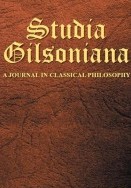LOVE AS THE PRINCIPLE OF THE DYNAMISM OF BEINGS (AN ANALYSIS OF THE ARGUMENTS OF ST. THOMAS AQUINAS)
LOVE AS THE PRINCIPLE OF THE DYNAMISM OF BEINGS (AN ANALYSIS OF THE ARGUMENTS OF ST. THOMAS AQUINAS)
Author(s): Arkadiusz GudaniecSubject(s): Philosophy
Published by: International Étienne Gilson Society
Keywords: love; being; dynamism; action; knowledge; end; cause; metaphysics; Thomas Aquinas;
Summary/Abstract: In ancient times, people pondered “cosmic love” (eros, philotes, thymos), i.e., the universal power that underlies the phenomena of the universe. The force of love extends to all things, including man and his action. Philosophers remarked rather early that love is, as it were, the foundation for the phenomena and actions that are experienced. As love is both of the character of a source and is strongly present in its manifestations, it turns out to be something that, on the one hand, is best known, but on the other hand, not easy to understand. In parallel, people also considered the strictly personal form of love—philia, whereby people are joined with each other in a special relation, which is friendship (Aristotle started this conception). The analogical scholastic conception of love was an interesting combination of those two tendencies; love is the foundation of action and in the metaphysical order it becomes the principle that explains the domain of being that we call dynamism. This article discusses Thomas Aquinas’ doctrine of love; first, it analyzes love’s relationship with action, end, and knowledge, then, secondly, investigates the place of love in the order of the causes of action.
Journal: Studia Gilsoniana
- Issue Year: 2014
- Issue No: 3
- Page Range: 301-319
- Page Count: 19
- Language: English

